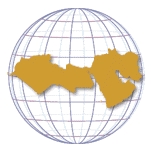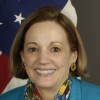The Bureau of Near Eastern Affairs (NEA) is an agency within the Department of State that deals with U.S. foreign policy and U.S. diplomatic relations with Algeria, Bahrain, Egypt, Iran, Iraq, Israel, Jordan, Kuwait, Lebanon, Libya, Morocco, Oman, Qatar, Saudi Arabia, Syria, Tunisia, United Arab Emirates, and Yemen. Regional policy issues that NEA handles include the war in Iraq, Middle East peace, terrorism, weapons of mass destruction, and political and economic reform.
The United States has been involved in the Middle East since the Cold War in 1949, the Harry S. Truman and Dwight D. Eisenhower administrations were committed to limiting communism around the world and laid the foundations of a U.S Middle Eastern policy. The U.S sought petroleum resources and military bases and sought to deny these resources to the Soviet Union. The U.S also promoted peace and stability in the region in order to push their own objectives. This led to the establishment of the Assistant Secretary for Near Eastern, South Asian, and African Affairs in October 3, 1949. The Hoover Commission recommended that certain offices be upgraded to the bureau level. The Department of State developed a Division of Near Eastern Affairs in 1909, which dealt with Central, Southern and Eastern Europe as well as the Middle East. However, in 1974 the Department transferred responsibility to Greece, Turkey, and Cyprus to the Bureau of European Affairs. The relations with African Nations also became the reasonability of a New Bureau of African Affairs in 1958, except for several North African nations which became apart of the Bureau of Near Eastern and South Asian Affairs in 1974. The Foreign Relations Authorization Act for Fiscal Years 1992 and 1993 authorized the appointment of an Assistant Secretary of State for South Asian Affairs which also established the Bureau of Near Eastern Affairs on August 24, 1992.
Caught in the Middle East: U.S. Policy toward the Arab-Israeli Conflict, 1945-1961 (by Peter L. Hahn, University of North Carolina Press)
The Bureau of Near Eastern Affairs is a key diplomatic office within the Department of State. According to the Bureau, it promotes U.S political and economic interests throughout the region. Instability in the Middle East directly affects U.S political and economic interests, therefore, the promotion of peace and democracy is a key initiative for the NEA. This initiative is seen throughout NEA’s objectives including: helping to rebuild and promote stability in Iraq, helping to resolve the Palestinian and Israeli conflict, counterterrorism and supporting efforts for political and economic reform in the region. NEA works with the Global Coalition Against Terrorism, the US Agency for International Development, and the Middle East Partnership Initiative.
Near Eastern Affairs Chiefs of Mission
The Bureau of Near Eastern Affairs conducts diplomatic affairs with eighteen foreign governments: Algeria, Bahrain, Egypt, Iran, Iraq, Israel, Jordan, Kuwait, Lebanon, Libya, Morocco, Oman, Qatar, Saudi Arabia, Syria, Tunisia, United Arab Emirates, and Yemen.
Pro-Israeli Lobbyists
US official retracts Iraq remarks
(BBC News)
- Table of Contents
- Overview
- History
- What it Does
- Where Does the Money Go
- Controversies
- Suggested Reforms
- Comments
- Leave a comment


President Barack Obama has nominated a career Foreign Service Officer who has spent the last two years serving as U.S. ambassador to Egypt to be the next lead diplomat on Middle East issues. During recent protests that ousted Egyptian president Mohamed Morsi from power on July 3, 2013, many Egyptians accused Anne W. Patterson of being too close to Morsi and the Muslim Brotherhood, and wild rumors about an impending impeachment of President Obama further soured her last months on the Nile.
Born on October 4, 1949, in Fort Smith, Arkansas, Patterson earned a B.A. from Wellesley College in 1971 and attended graduate school at the University of North Carolina for a year.
Patterson joined the U.S. Foreign Service in 1973 as an economic officer, and was promoted to career ambassador, the highest rank in the career Foreign Service, after 25 years’ service in 2008.
Early on, she held a variety of economic and political assignments, including in the Bureau of Inter-American Affairs, the Bureau of Intelligence and Research, and the Bureau of Economic and Business Affairs. Patterson served as economic counselor in Saudi Arabia from 1984 to 1988 and as political counselor to the U.S. Mission to the United Nations in Geneva, Switzerland, from 1988 to 1991. Back in Washington, she served as office director for Andean affairs from 1991 to 1993 and principal deputy assistant secretary and deputy assistant secretary of Inter-American affairs from 1993 to 1996.
Patterson spent six years in Latin America, as ambassador to El Salvador from 1997 to 2000 and ambassador to Colombia from 2000 to 2003. She returned stateside for a series of assignments: State Department deputy inspector general from 2003 to 2004, deputy permanent representative and acting permanent representative to the United Nations from 2004 to 2005, and assistant secretary of state for International Narcotics and Law Enforcement Affairs from 2005 to 2007.
Patterson served as ambassador to Pakistan from 2007 to 2010. According to a leaked diplomatic cable, while Patterson was in Pakistan, Pakistan’s prime minister, Benazir Bhutto, asked Patterson, in writing, for help in evaluating her security because she feared for her life, but Patterson and the George W. Bush administration took the position that her security was not the responsibility of the United States. In the words of the cable, “Ambassador strongly recommends against a U.S. Government evaluation, which would inevitably identify gaps (by American standards) in both equipment and training of personnel. The [U.S. Government] should either undertake full responsibility for Bhutto’s personal security or not.”
Two months later, Bhutto was assassinated.
Patterson is married to David R. Patterson, a retired Foreign Service officer. The couple has two sons, Edward and Andrew.
-Matt Bewig
To Learn More:
Speeches and Remarks as Ambassador to Egypt
Anne Patterson Outed By WikiLeaks As A Truth-Teller (by Dan Froomkin, Huffington Post)

In taking over the State Department’s Bureau of Near Eastern Affairs, Jeffrey D. Feltman is no stranger to the issues and key players of the region, having spent much of his Foreign Service career in diplomatic posts in Israel and Lebanon. Feltman is also a polarizing figure, as far as Syria and Hezbollah are concerned, after having dealt with him as U.S. ambassador to Lebanon during the second half of the Bush administration. Feltman was sworn in as assistant secretary on August 18, 2009.
- Latest News
- D.C. Public Schools will Teach all Second-Graders to Ride a Bike
- New Rule in Germany Limits Sales of Sex-Themed E-Books to 10pm to 6am
- What Happened to the 6-Year-Old Tibetan Boy the Chinese Government Kidnapped 20 Years Ago?
- U.S. Ambassador to Turkey Photoshops his Hair Color to Mock Turkish Mayor
- Mystery Artist Calls Attention to Unfixed Potholes by Drawing Penises around Them
The Bureau of Near Eastern Affairs (NEA) is an agency within the Department of State that deals with U.S. foreign policy and U.S. diplomatic relations with Algeria, Bahrain, Egypt, Iran, Iraq, Israel, Jordan, Kuwait, Lebanon, Libya, Morocco, Oman, Qatar, Saudi Arabia, Syria, Tunisia, United Arab Emirates, and Yemen. Regional policy issues that NEA handles include the war in Iraq, Middle East peace, terrorism, weapons of mass destruction, and political and economic reform.
The United States has been involved in the Middle East since the Cold War in 1949, the Harry S. Truman and Dwight D. Eisenhower administrations were committed to limiting communism around the world and laid the foundations of a U.S Middle Eastern policy. The U.S sought petroleum resources and military bases and sought to deny these resources to the Soviet Union. The U.S also promoted peace and stability in the region in order to push their own objectives. This led to the establishment of the Assistant Secretary for Near Eastern, South Asian, and African Affairs in October 3, 1949. The Hoover Commission recommended that certain offices be upgraded to the bureau level. The Department of State developed a Division of Near Eastern Affairs in 1909, which dealt with Central, Southern and Eastern Europe as well as the Middle East. However, in 1974 the Department transferred responsibility to Greece, Turkey, and Cyprus to the Bureau of European Affairs. The relations with African Nations also became the reasonability of a New Bureau of African Affairs in 1958, except for several North African nations which became apart of the Bureau of Near Eastern and South Asian Affairs in 1974. The Foreign Relations Authorization Act for Fiscal Years 1992 and 1993 authorized the appointment of an Assistant Secretary of State for South Asian Affairs which also established the Bureau of Near Eastern Affairs on August 24, 1992.
Caught in the Middle East: U.S. Policy toward the Arab-Israeli Conflict, 1945-1961 (by Peter L. Hahn, University of North Carolina Press)
The Bureau of Near Eastern Affairs is a key diplomatic office within the Department of State. According to the Bureau, it promotes U.S political and economic interests throughout the region. Instability in the Middle East directly affects U.S political and economic interests, therefore, the promotion of peace and democracy is a key initiative for the NEA. This initiative is seen throughout NEA’s objectives including: helping to rebuild and promote stability in Iraq, helping to resolve the Palestinian and Israeli conflict, counterterrorism and supporting efforts for political and economic reform in the region. NEA works with the Global Coalition Against Terrorism, the US Agency for International Development, and the Middle East Partnership Initiative.
Near Eastern Affairs Chiefs of Mission
The Bureau of Near Eastern Affairs conducts diplomatic affairs with eighteen foreign governments: Algeria, Bahrain, Egypt, Iran, Iraq, Israel, Jordan, Kuwait, Lebanon, Libya, Morocco, Oman, Qatar, Saudi Arabia, Syria, Tunisia, United Arab Emirates, and Yemen.
Pro-Israeli Lobbyists
US official retracts Iraq remarks
(BBC News)
Comments


President Barack Obama has nominated a career Foreign Service Officer who has spent the last two years serving as U.S. ambassador to Egypt to be the next lead diplomat on Middle East issues. During recent protests that ousted Egyptian president Mohamed Morsi from power on July 3, 2013, many Egyptians accused Anne W. Patterson of being too close to Morsi and the Muslim Brotherhood, and wild rumors about an impending impeachment of President Obama further soured her last months on the Nile.
Born on October 4, 1949, in Fort Smith, Arkansas, Patterson earned a B.A. from Wellesley College in 1971 and attended graduate school at the University of North Carolina for a year.
Patterson joined the U.S. Foreign Service in 1973 as an economic officer, and was promoted to career ambassador, the highest rank in the career Foreign Service, after 25 years’ service in 2008.
Early on, she held a variety of economic and political assignments, including in the Bureau of Inter-American Affairs, the Bureau of Intelligence and Research, and the Bureau of Economic and Business Affairs. Patterson served as economic counselor in Saudi Arabia from 1984 to 1988 and as political counselor to the U.S. Mission to the United Nations in Geneva, Switzerland, from 1988 to 1991. Back in Washington, she served as office director for Andean affairs from 1991 to 1993 and principal deputy assistant secretary and deputy assistant secretary of Inter-American affairs from 1993 to 1996.
Patterson spent six years in Latin America, as ambassador to El Salvador from 1997 to 2000 and ambassador to Colombia from 2000 to 2003. She returned stateside for a series of assignments: State Department deputy inspector general from 2003 to 2004, deputy permanent representative and acting permanent representative to the United Nations from 2004 to 2005, and assistant secretary of state for International Narcotics and Law Enforcement Affairs from 2005 to 2007.
Patterson served as ambassador to Pakistan from 2007 to 2010. According to a leaked diplomatic cable, while Patterson was in Pakistan, Pakistan’s prime minister, Benazir Bhutto, asked Patterson, in writing, for help in evaluating her security because she feared for her life, but Patterson and the George W. Bush administration took the position that her security was not the responsibility of the United States. In the words of the cable, “Ambassador strongly recommends against a U.S. Government evaluation, which would inevitably identify gaps (by American standards) in both equipment and training of personnel. The [U.S. Government] should either undertake full responsibility for Bhutto’s personal security or not.”
Two months later, Bhutto was assassinated.
Patterson is married to David R. Patterson, a retired Foreign Service officer. The couple has two sons, Edward and Andrew.
-Matt Bewig
To Learn More:
Speeches and Remarks as Ambassador to Egypt
Anne Patterson Outed By WikiLeaks As A Truth-Teller (by Dan Froomkin, Huffington Post)

In taking over the State Department’s Bureau of Near Eastern Affairs, Jeffrey D. Feltman is no stranger to the issues and key players of the region, having spent much of his Foreign Service career in diplomatic posts in Israel and Lebanon. Feltman is also a polarizing figure, as far as Syria and Hezbollah are concerned, after having dealt with him as U.S. ambassador to Lebanon during the second half of the Bush administration. Feltman was sworn in as assistant secretary on August 18, 2009.
- Latest News
- D.C. Public Schools will Teach all Second-Graders to Ride a Bike
- New Rule in Germany Limits Sales of Sex-Themed E-Books to 10pm to 6am
- What Happened to the 6-Year-Old Tibetan Boy the Chinese Government Kidnapped 20 Years Ago?
- U.S. Ambassador to Turkey Photoshops his Hair Color to Mock Turkish Mayor
- Mystery Artist Calls Attention to Unfixed Potholes by Drawing Penises around Them





Comments